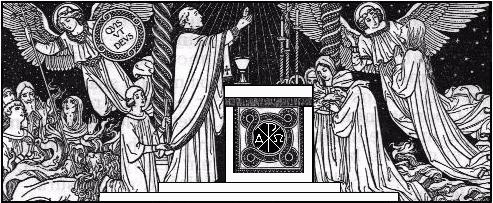In the All Saints Tide edition of the Mount Calvary Magazine in 1935, the rector reflected upon purgatory:
“People do not go to heaven when they die. Heaven is a special sphere of which the chief characteristic is the unveiled presence of God and only those souls who have been entirely cleansed from all stain of sin and so developed in spiritual capacity that they can bear the sight of God.”
“The mere physical fact of death does not change does not change a sinner into a saint. We die sinners and death is a door to a better life where temptation is removed and the ravages of sin are healed. When that work of purgation—cleansing—is completed, then the sinner has become a saint.”
Of our beloved dead:
“what does death do to them? It brings them before their Judge and they see themselves as He sees them; they feel their sins as never before and penitence takes full instead of partial possession of them; they claim no merits but claim only to the redeeming love of their Saviour. They want us who are left here to pray for them, especially to share in offering the Holy Sacrifice which continues to all souls the power of the Cross.”
It is a braider topic, but in the later Middles Ages Christians began to have a Cartesian sense of time and space, possibly because of the ubiquity of clocks and the recovery of perspective. They lost the awareness that both time and space will be (are) transfigured in the New Creation, and that the One Sacrifice of Calvary in 33 AD can also be present on the altar, and the Lamb standing as one slain in heaven is also present on the altar.
Judgment has two meanings: a person has good judgment if he sees things clearly and accurately and acts appropriately; but judgment also means a punishment.
The motto of the Dominicans is Veritas, Truth, and truth is the correspondence of the mind with reality. God sees everything accurately; we do not; in fact we engage in infinite self-deception.
At our judgment, God shows us the truth of our life: that we are not the persons he had planned for us to be, and they wee have really messed up (I’d like to use a stronger verb) our lives. But the blood of Jesus, if we accept it, washes all this away and restores the divine image in us.
We see everything that God has done for us, and how ungrateful we have been. That burning shame is the fire of purgatory.
Is it a punishment? Well, yes, but not an arbitrary one. It is intrinsic to our repentance and purgation.
He wrote of those who have prayed for the dead and themselves have died with no family or friends to pray for them:
“it grieves us to realize that some of those who in other years have been most loving in asking such prayers have gone to join those for whom they have prayed, leaving no one behind to go on remembering the family.”
Let s pray for all the members of Mount Calvary who have died, especially those who have been forgotten and have no one to pray for them.
As the prayer of Fatima in the rosary says “O my Jesus, save us from hell; lead all souls to heaven, especially those in most need of Thy mercy.”
